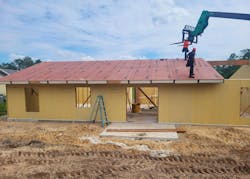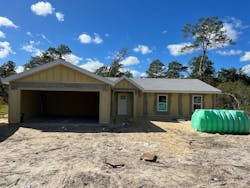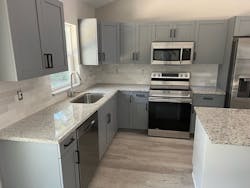Just under a year old, Bettr Homes is after nothing less than disrupting the US homebuilding industry. To do that, the Tampa, Florida-based startup takes a multipronged approach to innovative home construction.
Bettr Homes builds zero-energy, high-performance homes for the entry-level market. It simplifies the construction process by using structural insulated panels (SIPs) instead of traditional stick construction. And instead of relying wholly on either onsite trades or offsite factories that someone else owns, Bettr Homes and its sister company, SIPanels, manufacture SIPs in their own facility.
“As an enabler of disruption, we recognize we have to take the whole supply chain and integrate it,” says C.R. Herro, Bettr Homes’ EVP of operations.
SIMPLICITY OF SIPANELS
Well insulated and airtight, SIPs create a more energy-efficient home—which uses half the energy of a conventional home, according to Herro. Five workers take just one day to erect the panelized structure, which gets completed in about a tenth of the time as a conventional build and is twice as durable, Herro says. Simple, consistent, and repeatable, panelized construction is also easier for trades to learn.
For Herro, the question isn’t whether the homebuilding industry needs to embrace such innovations—but why it’s been slow to do so. “The industry has known it’s unable to continue in its current trajectory, but there’s been a surprising lack of responsiveness to address the performance and labor shortage issues,” he says. “To evolve homebuilding, we have to create change in an industry that doesn’t do change well.”
A few months ago, after 12 years with production builder Meritage Homes, Herro left his “cushy corporate gig,” he says, because “the current template of construction in the US is broken.” That template doesn’t adequately address ongoing labor shortages or the need for more efficient and more affordable homes.
Even including solar panels and advanced appliances and lighting, Bettr Homes’ units will be priced within 5% of comparable existing homes in the same neighborhoods, according to Herro.
With about 1,000 lots in its current portfolio, the company expects to build 800 units through next year. About 80 percent of those units will be built for rent, the rest for sale. While that will become more of a 50-50 breakdown over the next few years as Bettr Homes expands across the country, the company wants to enter both for-rent and for-sale markets so it can quickly achieve the economies of scale it’s after.
THE FUTURE FOR BETTR HOMES
Currently, Bettr Homes has one SIPanels factory in Florida, with plans to build two more (including one in the mid-Atlantic region) in the coming year. With a SIP facility able to transport its lightweight materials up to 200 miles away, the company intends to build factories that sit between major metropolitan markets.
ESG (environmental, social, and corporate governance) principles are at the heart of Bettr Homes’ business model. As Herro describes it, ESG is fundamentally about risk management—the strategic consideration of a company’s impacts on its people, communities, and industries as it strives to be a responsible corporate citizen.
But there’s also a strong business case for ESG, he adds. As Bettr Homes aims to attract investment dollars, major investors are looking for companies that take ESG seriously. “Investors are saying, ‘Do you have a robust business plan?’ And sustainability and governance are a big part of that,” Herro says.
Bettr Homes, which has about $40 million in funds, was founded by spouses Corey Donahue and Bridgette Cruz. Donahue used to work for Invitation Homes, one of the country’s largest owners of single-family rentals. In 2017, he co-founded the single-family rental platform Second Avenue.
For all its ambitions, Bettr Homes doesn’t think it can change the industry on its own. It has formed collaborative relationships with other forward-thinking organizations, such as Thrive Home Builders and the Housing Innovation Alliance, recently participating in an Alliance event on ESG's impact on the industry. And it participates in the EEBA’s Builder Benchmark Group, where high-performance builders come together to learn from one another and share best practices. “We want to be an agent of change, but we also want the industry to come along with us,” Herro says.
Bettr Homes isn’t competing against other high-performance builders, Herro adds. “What we’re really competing against is underperforming, poorly designed resale homes.”


